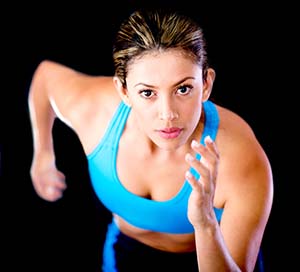
The benefits of sports are well recognized: organized athletics builds self-esteem, promotes physical conditioning, enhances skills, teaches the value of teamwork and sets a foundation for lifelong physical activity. Athletic competition, however, can also cause severe psychological and physical stress that is amplified in individuals struggling with anxiety, depression, and perfectionism. When the pressures of sport competition are added to cultural ideals that emphasize thinness or a certain body type, the risks increase for athletes to develop disordered eating.
Our research has examined how neurobiological mechanisms are expressed through behavior and personality these temperament traits that contribute to specific eating disorder symptomatology are the same traits that make people excellent athletes and excellent students.
| In the student | In the athlete | In an eating disorder | |
| Achievement-oriented | Strive for the highest grades; pursues excellent in academics | Strive for the highest performance; pursues excellence in their sport | Strive for the greatest weight loss; pursues excellence in dieting |
| Sensitive to consequences (over-estimates consequences and undervalues rewards) | (Potentially unwarranted) fear of upsetting teachers and parents serve as a motivator to study more | (Potentially unwarranted) fear of upsetting coaches serve as a motivator to train more | Over-estimates the consequences of not eating "perfectly." |
| High attention to detail and high error detection | Meticulous school work; studies subjects in depth | Studies the mechanics and details of their sport | Aware of every (perceived) flaw in their body, performance, and self. |
| Altered interoceptive awareness | Able to push past extreme fatigue to continue studying all night | Able to perform and train through discomfort, pain, or injuries | Extreme hunger and dieting results in minimal physical discomfort |
Eating disorder signs and symptoms specific to an athletic setting
As coaches and trainers, you are on the front lines of your athletes’ lives, and often the first to notice subtle changes in mood, behavior and performance that may indicate an eating disorder. The following information will help you more readily identify an athlete with an eating disorder and know what steps to take to address the problem.
It is important to identify disordered eating, excessive exercise or an eating disorder as soon as possible, as early detection is one of the best predictors of full recovery. Including the athlete’s parent or guardian in this discussion is recommended. The longer an eating disorder persists, the more difficult the recovery. Another reason for early intervention is that if not addressed early on, disordered eating habits can become pervasive on a team.
Symptoms you may notice include
- Decreased concentration, energy, muscle function, coordination, speed
- Increased fatigue and perceived exertion
- Longer recovery time needed after workouts, games, races
- More frequent muscle strains, sprains, and/or fractures
- Slowed heart rate and low blood pressure
- Reduced body temperature and increased sensitivity to cold—cold hands and feet
- Complaints of light-headedness and dizziness
- Gastrointestinal complaints such as nausea, constipation, abdominal pain and fullness
- Poorer interaction with coaches/teammates
- Perfectionism
- Increased impatience, crankiness
- Increased isolation
- Difficulty with days off and tapering
- Avoidance of water or excessive water intake
- Preoccupation with one’s own food
- Preoccupation with other people’s food
- Ritualistic eating and/or avoidance of certain foods
- Excessive concern with body aesthetic
- Decrease in performance, especially when combined with other signs
- Prolonged or additional training above and beyond what is required for sport (e.g., extra sit-ups and laps, extra workouts)
- Athletes on the team reporting concern about an individual
Athletes may also work very hard to hide their struggles. Personality shifts may occur, ranging from being more withdrawn and isolated to acting out excessively.

Medical consequences of disordered eating in athletes
Research is demonstrating what coaches have long witnessed: a thin athlete is not necessarily a strong athlete. While disordered eating may initially improve performance, athletes experience diminishing returns from dieting and over-training. An athlete suffering from an eating disorder will eventually plateau or decline in performance and may experience fatigue, dehydration, loss of endurance and speed, muscle cramps, and other physiological conditions.
Medical problems that can arise from eating disorders in athletes
- Heart failure
- Dehydration
- Anemia
- Swollen joints
- Irregular heart beat
- Osteoporosis
- Electrolyte imbalance that can lead to sudden death
Low resting heart rate is a frequent sign of many eating disorders, and is frequently missed in young athletes because physicians and other clinicians assume that the low pulse is due to fitness rather than cardiac issues. If a resting heart rate is less than 60 beats per minute and there are ANY signs of an eating disorder, the athlete could be at high risk for cardiac arrest and an eating disorder evaluation by a qualified provider should occur before the athlete returns to practice or competition.
At Your Service
UC San Diego Eating Disorders Center is a non-profit, university-based Center of Excellence that seeks to help people struggling with eating disorders through our research, treatment, and community outreach programs. In service of our mission, we offer a number of complimentary services including:
- Expert Speakers
- Our physicians, therapists, dieticians, and researchers are available to talk to coaches, teams, and parents. Contact us to schedule a talk.
- Consultation
- Many coaches and athletic directors tell us that they struggle with how to approach parents when they are concerned an athlete may have disordered eating. We are available to consult with you and/or directly with the parents to offer our expertise and guidance for next steps.
- Assessments
- We offer free, in-person, 90-minute assessments with our master’s level therapists. The assessment results are used to help athletes and their families determine the next steps.

Contact Information
- Admissions Department
- (858) 534-8019